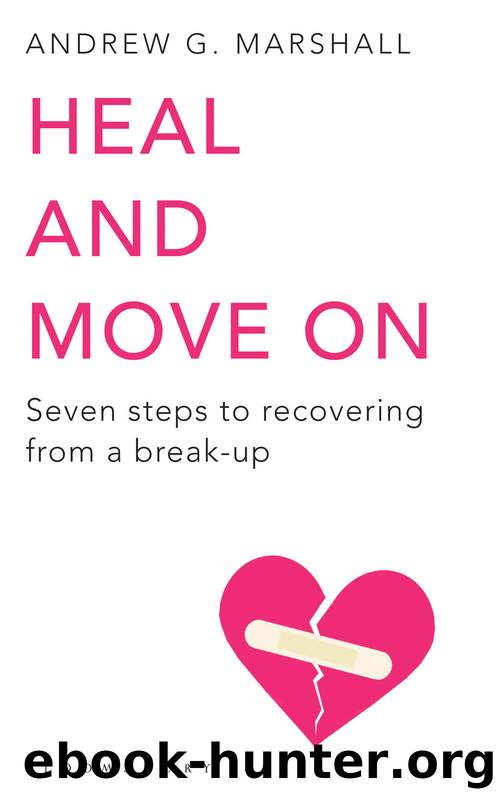Heal and Move On by Andrew G Marshall

Author:Andrew G Marshall
Language: eng
Format: epub
Publisher: Bloomsbury Publishing
Published: 2011-12-15T00:00:00+00:00
Roberta used this idea to look back over her fifteen-year marriage. She had a high for the birth of her daughter and after that everything was more or less a flat line. Beyond the last three and a half years, Robertaâs graph showed that her relationship had been better than she had painted it. âObviously, I have regrets but actually it was not all bad,â she concluded.
Five Stages of Grief
These were originally outlined by the Swiss-born psychiatrist Elisabeth Kübler-Ross, who wrote the seminal book On Death and Dying (Simon & Schuster, 1969). She had been working with terminally ill patients in New York and noticed that they moved through five stages: denial, anger, bargaining, depression and acceptance. Although Kübler-Rossâs prime aim was to help doctors approach the dying with sensitivity and understanding, her stages have been transferred wholesale into bereavement counselling without taking into consideration that losing someone is a totally different experience from dying. With that note of caution, the five stages are useful for coming to terms with loss â whether through death, divorce or relationship breakdown â because they show that our feelings are natural, healthy and very human.
Here are her five stages:
Denial
The first response to bad news is numbness: âNo, it canât be happening to me.â Denial is like a buffer against the shock. It provides us with a breathing space to collect our thoughts, find our coping strategies and gather our supporters. For Carrie, fifty-six, who ended her thirty-year marriage, it was like waking up from a long sleep: âI remember looking round the family dinner table one Christmas and knowing that I could not do this for another year. Suddenly, I realised that I had been fooling myself. My husband would never change and the relief . . . it flooded through me. It was only then that I understood just how sad I had been.â
Anger
The evidence is impossible to ignore. Finally, the truth dawns: âOh yes, it really is happening.â The next emotion is anger: âWhy me?â âWhat have I done?â Generally, there are two kinds of anger. The first makes complete sense â after all, we are very hurt â and is normally aimed at our partners (for betraying our love and trust) and ourselves (either for our mistakes or for not spotting the seriousness earlier). I call this kind: rational anger. The second sort of anger, however, is completely different. Although we need to be angry, we dare not show it to our partners (especially if we are trying to persuade them to stay). Instead, the feelings are dumped on to someone else. For example, the person who told us that our partner had been cheating, the other man or woman in the triangle, or our partnerâs family for âencouragingâ the break-up. I call this kind: irrational anger.
For the person who is left, the anger often lasts longer â especially if their partner has been unfaithful â and the ensuing depression phase involves a greater sense of being betrayed. Mark, twenty-eight, speaks for a lot of people: âI would have done anything for Francesca but it was never enough.
Download
This site does not store any files on its server. We only index and link to content provided by other sites. Please contact the content providers to delete copyright contents if any and email us, we'll remove relevant links or contents immediately.
The Sexcalation Method: A Step by Step System to Smoothly Escalate the Interaction to Sex by Smith Cory(194)
Stargazing by Kate Glanville(95)
In the Shadow of Sacrifice : Thoughts on Life and Success by Howard Calhoun(77)
Marriage Minute: Quick & Simple Ways to Build a Divorce-Proof Relationship by Dave Willis(76)
The Gay Man's Guide to Open and Monogamous Marriage by Michael Dale Kimmel(76)
A Journey For Jasmine (Blossoms Book 5) by Natalie Ann(75)
Heal and Move On by Andrew G Marshall(71)
Heart of Desire: a hockey romance novel (The Hearts Series Book 1) by Tiamzon Liana(71)
Love Without Numbers: Book One in the Bouvier Family Saga by Jade Dollston(66)
Miss Bishop by Bess Streeter Aldrich(64)
A Return For Ren (Blossoms Book 4) by Natalie Ann(63)
Back To Me (Paradise Place Book 15) by Natalie Ann(60)
Made to Lead: Finding a Virtuous Wife in Sodom by Robert Cossins(58)
Aunt Abigail's Beau by Amy Jo Cooper(58)
Understanding Misunderstandings by Robert L. Young(57)
If Nuns Were Wives by Chen Shani;Carlson Kristine;(56)
Let's Pretend This Is Normal by Miriam Verheyden(55)
Mine for the Night by Kia Carrington-Russell(55)
May the Best Man Win by Gail Hamilton(54)
